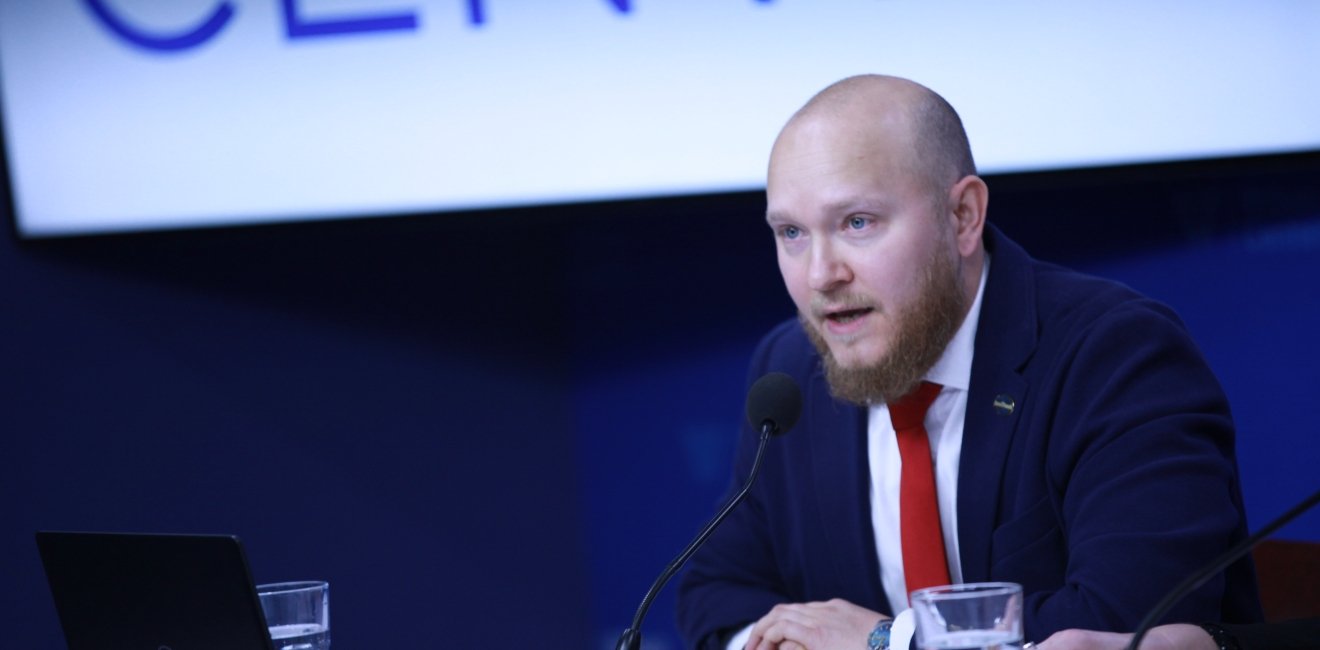Ruslan Garipov is a Woodrow Wilson Fellow with the Polar Institute, where he researches indigenous populations in the Russian polar north and greater Arctic region. The Kennan Institute recently asked him to reflect on his work at The Wilson Center and on how he hopes his research will have an impact on policy going forward.
Q: Tell me about your background and what brought you to The Wilson Center.
I was born in the USSR (Kazan) in 1979 and at the age of three moved to East Berlin when my father, a Soviet army officer, was deployed there for five years. During our time there, I fell in love with many famous German authors and westerns produced by Germans and was captivated by the Native American experience. From 1987 until the collapse of the USSR, we lived in Odessa, a strategic port city on the Black Sea in the Ukrainian Soviet Socialist Republic. My obsession with Native American history and culture continued during this time, and I read stories of their escapades all through school.
After attending law school at Kazan State University and later receiving my PhD in international law in 2004, I received a Fulbright scholarship that finally enabled me to travel to the United States. In this role, I spent six months at the Woodrow Wilson Center’s Kennan Institute researching American federalism and Native Americans’ rights. I traveled extensively across the United States, including to the Navajo Nation reservation in the American Southwest.
After meeting with the Russian delegation at the United Nations Permanent Forum on Indigenous Issues, I began to focus not just on the issues confronting the indigenous peoples of America, but also on those residing in Russia. In 2011, I returned to the Kennan Institute, spending three months continuing my research on indigenous peoples’ rights. In 2014, I once again returned to the Kennan Institute as a George F. Kennan Scholar and also became a scholar-in-residence at the American University Washington College of Law.
I applied for a Woodrow Wilson Fellowship because I have been to the center several times before, and I know it is one of the best non-partisan policy hubs for tackling global issues through independent research and open dialogue. This is the best opportunity for me to inform and develop solutions to problems that indigenous peoples in the Arctic are facing.
Q: Talk about what you are working on here.
My research is on Arctic sustainable development and indigenous peoples’ rights with a focus on the relationships between extractive industries and indigenous communities in the polar region. Rapidly evolving indigenous-industry relationships and different stakeholders’ expectations raise many interesting issues such as human rights, legal precedents, negotiation processes regulation, and corporate social responsibility.
The majority of the Arctic population are indigenous communities who occupy these territories, which are full of natural resources. Different ways of living and using natural resources often cause conflicts between extractive businesses and indigenous peoples. In many polar countries, indigenous communities must put up a fight against governments and certain national corporations to keep their lands and their lifestyles. I am examining international law in this field as well as how its standards should apply to the interactions between governments, businesses, and indigenous peoples. Special emphasis is given to the importance of free, prior, and informed consent of indigenous peoples concerning any proposed commercial development on their territories as well as other crucial international institutions, practices, and their application.
My research project explores the Arctic as a region that is rapidly evolving because of climate change and industrialization. The polar region is home to many indigenous communities who have a vital role in environmental management and development because of their knowledge and traditional practices. Intended to promote comparative and interdisciplinary inquiry, my research covers a broad range of political, socioeconomic, legal, and environmental issues linked to the Arctic and indigenous peoples’ effective participation in the achievement of sustainable development in the region. The research project analyzes sustainable development in the Arctic and indigenous peoples’ rights in the seven polar countries: the USA (Alaska), Canada, Denmark (Greenland), Russia, Norway, Finland, and Sweden.
Q: How did you become interested in your current research topic?
During the Soviet period, so-called “Red Westerns” were produced as a part of anti-American propaganda, featuring Native Americans as the heroes. In addition, many people in the Soviet Union fell in love with Native American culture and history because of German and American writers such as Karl May, Liselotte Welskopf-Henrich, James Willard Schultz, James Fennimore Cooper, Thomas Mayne Reid, Henry Longfellow and others. I watched these westerns and read their publications, which influenced me over time. My interest in indigenous peoples’ issues formed out of my passion for Native American history and culture, which transformed into my current research interests in sustainable development in the Arctic and indigenous peoples’ rights.
Q: Why does your research matter?
The UN has developed Sustainable Development Goals for 2030. Achieving these goals is impossible without involving indigenous peoples on many issues, including fisheries, climate change mitigation and adaptation, and ecosystem restoration in the polar region. It is critical to ensure that indigenous peoples have a proper governance structure, decision-making power, and capacity to participate effectively in the achievement of these goals.
Indigenous peoples also represent one of the poorest and most disenfranchised segments of society, which isolates them from decision-making processes. In the northern territories, many indigenous groups are now in danger of disappearing because of pollution and threats to their traditional ways of life. Many of them move to the cities, where they often face social exclusion, discrimination, and finally, problems with assimilation. Indigenous peoples are highly susceptible to unemployment, face a variety of socioeconomic challenges, struggle to preserve their traditional activities, and often lose their native language and culture. The most concerning issue is the right to their lands and to their traditional ways of life.
Q: What is the most challenging aspect of your research?
It is important to understand the key elements of sustainable development as well as the environmental and social impacts of climate variability in the Artic. It is also important to know how this rapidly changing region creates new ambitions and affects the local communities of the region.
One can begin to understand these aspects of the polar region by analyzing and applying scientific perspectives and traditional knowledge of local indigenous communities in the Arctic. The Arctic peoples have a unique relationship with their environment, and researchers can use the conceptual framework of traditional knowledge to explain how these relationships shape Arctic perspectives on important global issues such as natural resource management, environmental conservation, and global climate change.
Furthermore, it is critical to examine indigenous peoples’ legal status and rights, including the right to self-determination, rights over lands and natural resources, and the application of international and domestic standards in all polar countries.
The main challenge of this research is to find a way to combine economic benefits with the preservation of unique ecosystems and indigenous communities in the Arctic. It is, therefore, important to emphasize indigenous peoples’ connection to the land and subsistence off its natural resources. Their lifestyle, which is rooted in sustainable development, requires a different way of thinking compared to most modern-day populations which do not rely on subsistence.
Finally, another important challenge is to break down racist stereotyping of indigenous peoples and protect them from violence.
Q: How do you hope your research will have a positive impact on policy and/or indigenous communities?
Apart from developing the national legislation in all Arctic states and implementing the international standards, we need to strengthen local management capacity and provide for the enforcement of laws designed to protect rights of indigenous peoples in the polar region. Some indigenous peoples have succeeded in maintaining their indigenous knowledge and practices despite efforts to assimilate them, which include valuable approaches to sustainable development.
It is vital to bring to the fore the internationally recognized principle of free, prior, and informed consent of indigenous peoples concerning any proposed commercial development on their territories. Commercial enterprises must recognize indigenous peoples as equal partners and allow them the opportunity to co-manage profitable projects. Protecting the environment and lands of indigenous peoples as well as their traditional way of life and traditional natural resource use is indispensable.
Author

Associate Professor, Kazan Federal University, Russia; Adjunct Professor, American University

Kennan Institute
After more than 50 years as a vital part of the Wilson Center legacy, the Kennan Institute has become an independent think tank. You can find the current website for the Kennan Institute at kennaninstitute.org. Please look for future announcements about partnership activities between the Wilson Center and the Kennan Institute at Wilson Center Press Room. The Wilson Center is proud of its historic connection to the Kennan Institute and looks forward to supporting its activities as an independent center of knowledge. The Kennan Institute is committed to improving American understanding of Russia, Ukraine, Central Asia, the South Caucasus, and the surrounding region through research and exchange. Read more


Polar Institute
Since its inception in 2017, the Polar Institute has become a premier forum for discussion and policy analysis of Arctic and Antarctic issues, and is known in Washington, DC and elsewhere as the Arctic Public Square. The Institute holistically studies the central policy issues facing these regions—with an emphasis on Arctic governance, climate change, economic development, scientific research, security, and Indigenous communities—and communicates trusted analysis to policymakers and other stakeholders. Read more

Explore More
Browse Insights & Analysis
Ruslan Garipov

Talking to the Dead to Heal the Living


